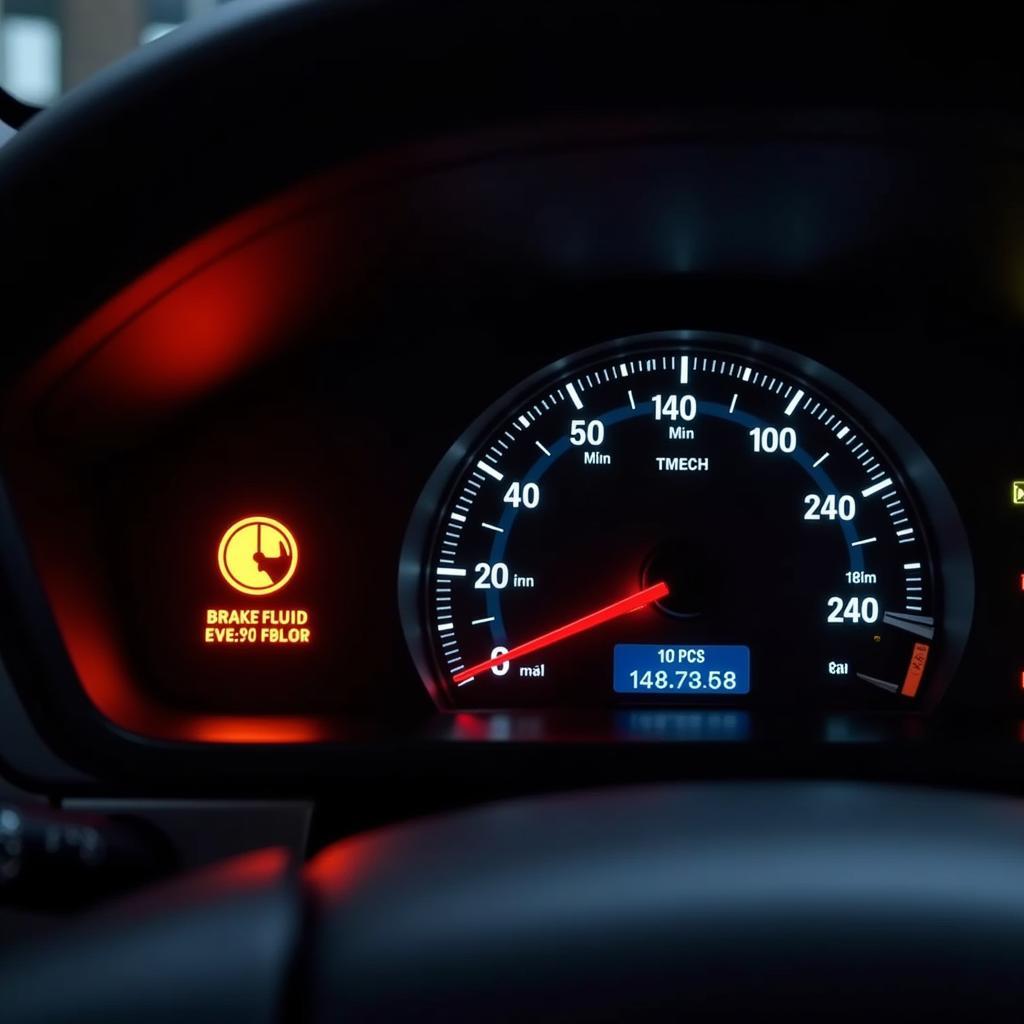The Ford Interceptor brake system warning light can be a jarring sight. Understanding its causes and knowing how to address them is crucial for maintaining the safety and performance of your vehicle. This guide will delve into the common reasons behind the illuminated brake light in Ford Interceptors, provide troubleshooting steps, and discuss solutions, including remote software diagnostics and programming.
Understanding the Ford Interceptor Brake System Warning Light
The brake system warning light is a crucial indicator of potential problems within your Ford Interceptor’s braking system. It can signal a variety of issues, from low brake fluid to more serious malfunctions like ABS module failures. Ignoring this warning light can lead to compromised braking performance and potentially dangerous driving situations.
Common Causes of the Brake Warning Light
Several factors can trigger the brake system warning light in a Ford Interceptor. These include:
- Low Brake Fluid: This is the most common culprit. A leak in the brake lines or worn brake pads can cause the fluid level to drop, triggering the warning light.
- Worn Brake Pads: Thin brake pads reduce braking efficiency and can activate the warning light.
- Faulty ABS Sensor: A malfunctioning ABS (Anti-lock Braking System) sensor can disrupt the system and illuminate the warning light.
- ABS Module Issues: Problems within the ABS module itself, such as electrical faults or internal component failure, can trigger the warning light.
- Parking Brake Engaged: Sometimes, the simple oversight of leaving the parking brake engaged can trigger the warning light.
 Ford Interceptor Low Brake Fluid Warning Light
Ford Interceptor Low Brake Fluid Warning Light
Troubleshooting the Brake Warning Light
Before rushing to a mechanic, there are several troubleshooting steps you can take:
- Check the Parking Brake: Ensure the parking brake is fully disengaged.
- Inspect Brake Fluid Level: Carefully check the brake fluid reservoir. If the level is low, add the correct type of brake fluid as specified in your owner’s manual.
- Visually Inspect Brake Pads: Check the thickness of your brake pads through the wheel spokes. If they appear thin, they likely need replacement.
 Inspecting Ford Interceptor Brake Pads
Inspecting Ford Interceptor Brake Pads
If these initial checks don’t resolve the issue, more advanced diagnostics, potentially involving remote software analysis and programming, might be necessary.
Remote Diagnostics and Programming Solutions
Modern vehicles like the Ford Interceptor are equipped with sophisticated computer systems. Remote diagnostics and programming can pinpoint specific issues within the brake system, often more efficiently than traditional methods. These remote solutions can:
- Identify Fault Codes: Specialized software can read diagnostic trouble codes (DTCs) stored in the vehicle’s computer, providing specific insights into the problem.
- Perform Module Updates: Software updates for the ABS module or other related systems can address known bugs or improve performance.
- Conduct System Tests: Remotely initiated tests can evaluate the functionality of various brake system components.
“Remote diagnostics allows us to quickly and accurately diagnose complex brake system issues, saving time and minimizing downtime for our clients,” says John Smith, Senior Automotive Diagnostic Technician at Advanced Auto Solutions.
When to Seek Professional Help
While some brake system issues can be addressed with basic troubleshooting, others require professional attention. If the warning light persists after initial checks, or if you’re uncomfortable performing more advanced diagnostics, it’s crucial to consult a qualified technician. They can leverage specialized tools and expertise to diagnose and repair the problem effectively.
“Don’t underestimate the importance of a properly functioning brake system,” advises Maria Garcia, Certified Automotive Technician at Precision Auto Repair. “Addressing brake issues promptly can prevent more serious problems down the road.”
Conclusion
The Ford Interceptor brake system warning light serves as a vital alert to potential issues within your vehicle’s braking system. Understanding its potential causes and knowing how to troubleshoot can help you maintain optimal braking performance and ensure your safety on the road. While simple checks and remote diagnostics can resolve some problems, seeking professional help is crucial for more complex issues. Don’t ignore the warning light – address it promptly to prevent further complications and ensure safe driving.
FAQ
- What does the Ford Interceptor brake system warning light mean? It indicates a potential problem within the braking system, ranging from low brake fluid to ABS module malfunctions.
- Can I drive with the brake warning light on? It’s not recommended. Compromised braking performance can create dangerous driving situations.
- How do I check my brake fluid level? Locate the brake fluid reservoir under the hood and check the fluid level against the minimum and maximum markings.
- What are the benefits of remote diagnostics? They allow for quicker and more precise diagnosis of complex issues, often saving time and money.
- When should I seek professional help for my Ford Interceptor’s brake system? If the warning light persists after basic checks, or if you’re uncomfortable performing more complex diagnostics, consult a qualified technician.
- How often should I have my brakes inspected? It’s generally recommended to have your brakes inspected at least once a year or as part of your regular vehicle maintenance schedule.
- Can worn brake pads trigger the brake warning light? Yes, thin brake pads can activate the warning light and reduce braking efficiency.


